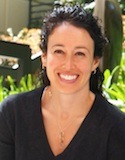
Cigall Kadoch
Dana-Farber Cancer Institute
44 Binney St.
Dana Building, Room D620
Boston, MA 02115
Tel: 617-632-2072
Email: cigall_kadoch@dfci.harvard.edu
Website: kadochlab.org
Lab Size: Between 20-25
Summary
Our laboratory is centered in understanding the structure and function of ATP-dependent chromatin remodeling complexes, with an emphasis on their role in human cancer. Over the past several years, we have developed extensive expertise in the application of protein biochemistry, structural analyses, and genomics to uncover the mechanistic sequelae of perturbation to the genes encoding subunits of the mammalian SWI/SNF (mSWI/SNF or BAF) chromatin remodeling complex. The growing number of exome- and genome-wide sequencing studies in human cancers has revealed a significant and previously unappreciated role for mSWI/SNF complexes as both tumor suppressors and oncogenes. Our group integrates human cancer genetics with biochemistry, structural biology, chemical biology, and functional genomics and epigenomics to understand mSWI/SNF complex function and to inform new strategies toward therapeutic development. In particular, we have focused our efforts on cancers with well-defined genomic lesions, such as synovial sarcoma, malignant rhabdoid tumor, and more recently, a range of human tumors that exhibit unique dependencies on specific mSWI/SNF complex subunits and transcription factors which tether to their surfaces.
Publications
Pan J, McKenzie ZM, D’Avino AR, Mashtalir N, Lareau CA, St. Pierre R, Wang L, Shilatifard A, Kadoch C. The ATPase module of mammalian SWI/SNF family complexes mediates subcomplex identity and catalytic activity-independent genomic targeting. Nature Genet. 2019 Apr; 51(4): 618-626.
Michel BC*, D’Avino AR*, Cassel SH*, Mashtalir N, McKenzie ZM, McBride MJ, Valencia AM, Zhou Q, Bocker M, Soares LMM, Pan J, Remillard DI, Lareau CA, Zullow HJ, Fortoul N, Gray NS, Bradner JE, Chan H, Kadoch C. A non-canonical SWI/SNF complex is a synthetic lethal target in cancers driven by BAF complex perturbation. Nat Cell Biol. 2018 Dec;20(12):1410-1420.
MashtalirN, D’Avino AR*, Michel BC*, LuoJ, Pan J, Otto JE, Zullow HJ, McKenzie MZ, Kubiak RL, St. Pierre R, Valencia AM, Poynter SJ, Cassel SH, Ranish JA, Kadoch C. Modular organization and assembly of SWI/SNF family chromatin remodeling complexes. Cell. 2018 Nov 15;175(5):1272-1288.e20.
Sandoval GJ, Pulice, J, Schenone M, Takeda DY, Pop, M, McBride MJ, Boulay GS, Rivera MN, Hahn WC, Kadoch C. Binding of TMPRSS2-ERG to mSWI/SNF (BAF) complexes mediates prostate oncogenesis. Molecular Cell. 2018 Aug 16; 71(4):554-566.
McBride M, Pulice JL, Nakayama RT, Beird HC, Ingram DR, D’Avino AR, Shern JF, Charville GR, Hornick JL, Araujo D, Wang W, Tsai J, Yeagley M, Wagner AJ, Futreal AP, Khan J, Lazar AJ, Kadoch C. The SS18-SSX fusion oncoprotein hijacks BAF complex targeting and function to drive synovial sarcoma. Cancer Cell. 2018 Jun 33; 6:1128-1141.
Pan J, Meyers RM, Michel BC, Mashtalir N, Sizemore A, Wells JN, Cassel SH, Vasquez F, Weir BA, Hahn WC, Marsh JA, Tsherniak A, Kadoch C. Functional analysis of mammalian protein complexes using genome-scale fitness screens. Cell Systems. 2018 May 6(5): 555-568.
Nakayama RT, Pulice JL, Valencia AM, McBride MJ, McKenzie ZM, Gillespie MJ, Ku WL, Teng M, Cui K, Williams RT, Cassel SH, Qing H, Widmer CJ, Demetri GD, Irizarry RA, Zhao K, Ranish JA, Kadoch C. SMARCB1 is required for widespread BAF complex-mediated activation of enhancers and bivalent promoters. Nature Genetics. 2017 Nov 49(11):1613-1623.
Boulay G, Sandoval GJ, Riggi N, Iyer S, Buisson R, Naigles B, Awad ME, Rengarajan S, Volorio A, McBride MJ, Broye LC, Zou L, Stamenkovic I, Kadoch C*, Rivera MN*. Cancer-specific retargeting of BAF complexes by a prion-like domain. Cell. 2017 Sep 171(1): 163-178. *indicates co-corresponding authors.
Review Articles
Valencia AM, Kadoch C. Chromatin regulatory mechanisms and therapeutic opportunities in cancer. Nat Cell Biol. 2019 Feb;21(2): 152-161.
Pulice JL, Kadoch C. Composition and function of mammalian SWI/SNF chromatin remodeling complexes in human disease. Cold Spring Harb Symp Quant Biol. 2017 Apr 13; pii:031021.
St Pierre R, Kadoch C. Mammalian SWI/SNF complexes in cancer: emerging therapeutic approaches. Curr Opin Genet Dev. 2017 Apr 6; 42:56-67.
